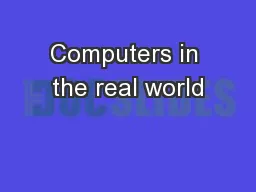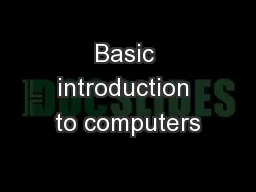PPT-History of Computers
Author : min-jolicoeur | Published Date : 2015-10-03
Tori Harbin 3 rd period Who invented the first computer 1837 Charles Babbage a British professor of mathematics had an idea for Analytical Engine the first storedprogram
Presentation Embed Code
Download Presentation
Download Presentation The PPT/PDF document "History of Computers" is the property of its rightful owner. Permission is granted to download and print the materials on this website for personal, non-commercial use only, and to display it on your personal computer provided you do not modify the materials and that you retain all copyright notices contained in the materials. By downloading content from our website, you accept the terms of this agreement.
History of Computers: Transcript
Download Rules Of Document
"History of Computers"The content belongs to its owner. You may download and print it for personal use, without modification, and keep all copyright notices. By downloading, you agree to these terms.
Related Documents














